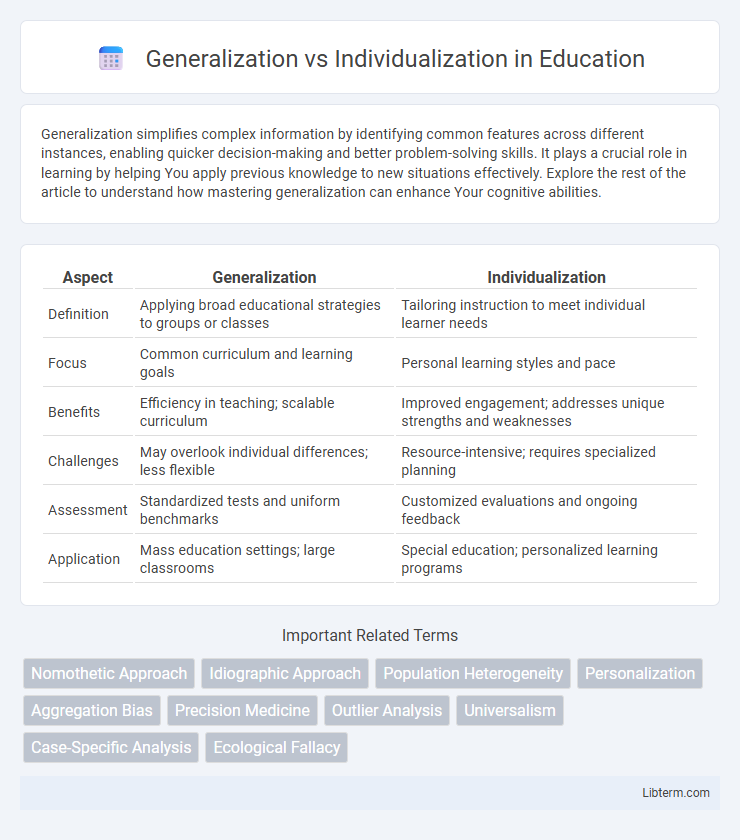Generalization simplifies complex information by identifying common features across different instances, enabling quicker decision-making and better problem-solving skills. It plays a crucial role in learning by helping You apply previous knowledge to new situations effectively. Explore the rest of the article to understand how mastering generalization can enhance Your cognitive abilities.
Table of Comparison
| Aspect | Generalization | Individualization |
|---|---|---|
| Definition | Applying broad educational strategies to groups or classes | Tailoring instruction to meet individual learner needs |
| Focus | Common curriculum and learning goals | Personal learning styles and pace |
| Benefits | Efficiency in teaching; scalable curriculum | Improved engagement; addresses unique strengths and weaknesses |
| Challenges | May overlook individual differences; less flexible | Resource-intensive; requires specialized planning |
| Assessment | Standardized tests and uniform benchmarks | Customized evaluations and ongoing feedback |
| Application | Mass education settings; large classrooms | Special education; personalized learning programs |
Understanding Generalization and Individualization
Understanding generalization involves recognizing patterns and applying learned knowledge across diverse situations to enhance cognitive efficiency and decision-making. Individualization emphasizes tailoring approaches based on unique characteristics and specific needs, promoting personalized experiences and targeted interventions. Balancing generalization and individualization enables effective problem-solving by integrating broad knowledge with context-sensitive adjustments.
Historical Perspectives on Learning Approaches
Historical perspectives on learning approaches reveal a persistent tension between generalization and individualization, where early behaviorist theories emphasized generalization through conditioning principles applicable across subjects. Contrarily, humanistic and constructivist movements advocated individualization by recognizing unique learner experiences and personalized instruction. This shift highlights an evolving understanding of cognitive diversity and the necessity for adaptive teaching methods to meet diverse educational needs.
The Science Behind Generalization
The science behind generalization involves the brain's ability to apply learned concepts or behaviors from specific experiences to broader, novel contexts, relying on neural mechanisms such as synaptic plasticity and pattern recognition in the hippocampus and prefrontal cortex. Generalization enables efficient decision-making by creating cognitive schemas that reduce the need for relearning, supported by studies in behavioral psychology and machine learning algorithms modeling human learning patterns. Research highlights how overgeneralization can lead to cognitive biases, whereas optimal generalization balances flexibility and accuracy in adapting to changing environments.
The Importance of Individualization in Modern Contexts
Individualization plays a crucial role in modern contexts by addressing unique needs and preferences, enhancing personalized experiences in education, healthcare, and customer service. Tailoring solutions based on individual data and behaviors improves effectiveness, satisfaction, and engagement compared to generalized approaches. Advances in technology and data analytics enable precise individualization, driving innovation and competitive advantage across industries.
Benefits and Drawbacks of Generalized Strategies
Generalized strategies offer scalability and cost-efficiency by applying uniform approaches across diverse markets, simplifying management and reducing resource allocation. However, these strategies may overlook specific customer preferences and cultural nuances, potentially leading to reduced relevance and engagement in certain segments. Balancing broad market appeal with the risk of diminished personalization challenges companies seeking global competitiveness.
Personalization: Tailoring Solutions for the Individual
Personalization optimizes user experience by tailoring solutions to individual preferences, behaviors, and needs using advanced data analytics and machine learning algorithms. Unlike generalization, which applies broad patterns to groups, personalization leverages granular data to deliver customized content, products, or services with higher relevance and engagement. This approach enhances customer satisfaction and loyalty by addressing unique individual characteristics in real-time.
When to Apply Generalization vs Individualization
Generalization is most effective when addressing common patterns or behaviors shared across groups, enabling scalable solutions in education, marketing, and policymaking. Individualization should be applied when unique needs, preferences, or circumstances significantly impact outcomes, such as personalized medicine, customized learning plans, or tailored customer experiences. Balancing generalization and individualization depends on the context's complexity and the desired precision of intervention or analysis.
Real-World Examples and Case Studies
Generalization enables marketers to target broad customer segments by identifying common behaviors, as seen in Amazon's recommendation engine which suggests products based on aggregated user data. Individualization tailors experiences to unique consumer preferences, exemplified by Netflix's personalized content recommendations that analyze individual viewing habits. Case studies from Spotify highlight how blending generalization with individualization enhances user engagement through personalized playlists informed by both group trends and personal listening history.
Balancing Generalization and Individualization
Balancing generalization and individualization in education involves creating curricula that address common learning goals while adapting to unique student needs and learning styles. This approach maximizes overall effectiveness by leveraging standardized content for foundational skills and personalized strategies to enhance engagement and mastery. Data-driven assessment tools support this balance by identifying student-specific strengths and gaps, enabling targeted instruction without sacrificing broad educational standards.
Future Trends in Personalized and Generalized Approaches
Future trends in personalized approaches emphasize advanced AI algorithms analyzing individual behavior and preferences to deliver tailored content and experiences. Generalized approaches are evolving through large-scale data integration and machine learning models that optimize solutions across diverse populations while maintaining efficiency. Hybrid models combining personalization with generalization are emerging to balance scalability and customization, enhancing user satisfaction and business outcomes.
Generalization Infographic

 libterm.com
libterm.com